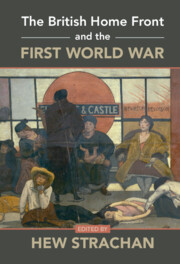Book contents
- The British Home Front and the First World War
- The British Home Front and the First World War
- Copyright page
- Contents
- Figures
- Tables and Charts
- Contributors
- Acknowledgements
- A Note on the Illustrations
- Introduction
- 1 The United Kingdom in 1914
- Part I Government
- 2 The Monarchy
- 3 The Growth of Cabinet Government
- 4 The Defence of the Realm Act and Other Emergency Laws
- 5 Local Government and the Great War: The Experience in Essex
- 6 The Clergy and Cultural Mobilisation
- Part II Resources
- Part III People
- Part IV Production
- Part V Social Impacts
- Conclusion
- Index
4 - The Defence of the Realm Act and Other Emergency Laws
from Part I - Government
Published online by Cambridge University Press: 23 February 2023
- The British Home Front and the First World War
- The British Home Front and the First World War
- Copyright page
- Contents
- Figures
- Tables and Charts
- Contributors
- Acknowledgements
- A Note on the Illustrations
- Introduction
- 1 The United Kingdom in 1914
- Part I Government
- 2 The Monarchy
- 3 The Growth of Cabinet Government
- 4 The Defence of the Realm Act and Other Emergency Laws
- 5 Local Government and the Great War: The Experience in Essex
- 6 The Clergy and Cultural Mobilisation
- Part II Resources
- Part III People
- Part IV Production
- Part V Social Impacts
- Conclusion
- Index
Summary
This chapter seeks to offer an overview of the legal powers at the disposal of the British government to secure its domestic objectives during the First World War.1 It argues broadly that a flexible and frequently changing legal framework for wartime domestic policy, notwithstanding instances of legal bluffing and occasional repressive action by the executive against industrial militants and the critical press, reflected sensitivity on the part of the authorities to the stresses and tensions caused by wartime legal restrictions and shortages. The most important of these legal powers were those granted under a succession of Defence of the Realm Acts (DORA) enacted throughout the war. These acts authorised the promulgation by the Privy Council of hundreds of Defence Regulations covering most facets of economic and social life on the home front. Those regulations, in turn, devolved legal powers to more subordinate governmental levels, normally ministers of the crown, where ‘notices’, ‘orders’, and ‘rules’, whether of local or of more general application, industry-wide or narrowly focused, would be issued. It may also be noted that wartime delegated or sub-delegated powers could be granted by pre-August 1914 legislation, and could be conferred on statutory bodies, not just on ministers. For example, the Scottish Insurance Commissioners were granted powers under the National Insurance Act 1911 to make regulations during the war whereby individuals who represented insured persons on insurance committees, and who were absent on war service for more than six months without leave of the committee, would not be deemed to have ceased to be members of the insurance committee.
- Type
- Chapter
- Information
- The British Home Front and the First World War , pp. 78 - 94Publisher: Cambridge University PressPrint publication year: 2023



